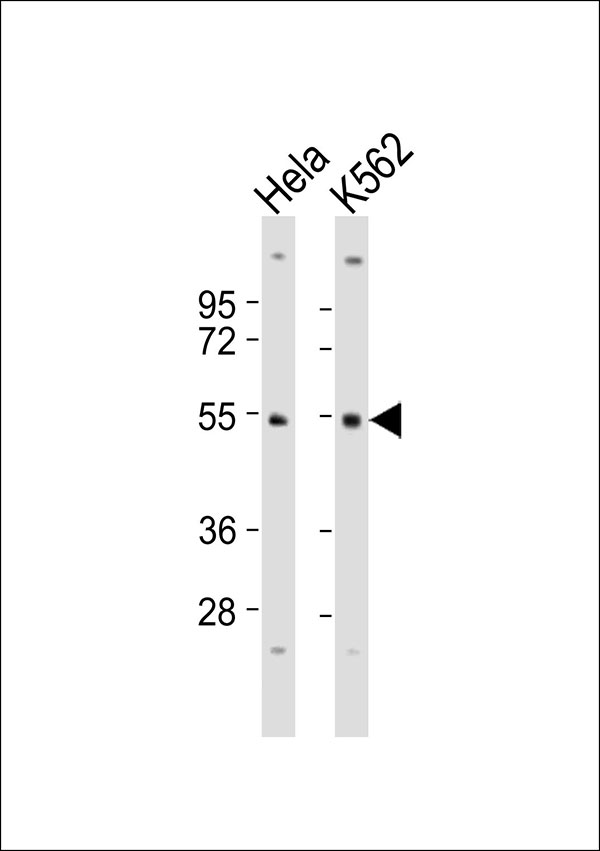SKP2 Antibody
Purified Rabbit Polyclonal Antibody (Pab)
- 产品详情
- 实验流程
- 背景知识
Application
| WB |
|---|---|
| Primary Accession | Q13309 |
| Reactivity | Human |
| Host | Rabbit |
| Clonality | Polyclonal |
| Calculated MW | 47761 Da |
| Gene ID | 6502 |
|---|---|
| Other Names | S-phase kinase-associated protein 2, Cyclin-A/CDK2-associated protein p45, F-box protein Skp2, F-box/LRR-repeat protein 1, p45skp2, SKP2, FBXL1 |
| Target/Specificity | KLH-conjugated synthetic peptide encompassing a sequence within the C-term region of human SKP2. The exact sequence is proprietary. |
| Dilution | WB~~ 1:1000 |
| Format | 0.01M PBS, pH 7.2, 0.09% (W/V) Sodium azide, Glycerol 50% |
| Storage | Store at -20 °C.Stable for 12 months from date of receipt |
| Name | SKP2 |
|---|---|
| Synonyms | FBXL1 |
| Function | Substrate recognition component of a SCF (SKP1-CUL1-F-box protein) E3 ubiquitin-protein ligase complex which mediates the ubiquitination and subsequent proteasomal degradation of target proteins involved in cell cycle progression, signal transduction and transcription (PubMed:9736735, PubMed:11931757, PubMed:12435635, PubMed:12769844, PubMed:12840033, PubMed:15342634, PubMed:15668399, PubMed:15949444, PubMed:16103164, PubMed:16262255, PubMed:16581786, PubMed:16951159, PubMed:17908926, PubMed:17962192, PubMed:22464731, PubMed:22770219, PubMed:32267835). Specifically recognizes phosphorylated CDKN1B/p27kip and is involved in regulation of G1/S transition (By similarity). Degradation of CDKN1B/p27kip also requires CKS1 (By similarity). Recognizes target proteins ORC1, CDT1, RBL2, KMT2A/MLL1, CDK9, RAG2, NBN, FOXO1, UBP43, YTHDF2, and probably MYC, TOB1 and TAL1 (PubMed:11931757, PubMed:12435635, PubMed:12769844, PubMed:12840033, PubMed:15342634, PubMed:15668399, PubMed:15949444, PubMed:16103164, PubMed:16581786, PubMed:16951159, PubMed:17908926, PubMed:17962192, PubMed:22464731, PubMed:32267835). Degradation of TAL1 also requires STUB1 (PubMed:17962192). Recognizes CDKN1A in association with CCNE1 or CCNE2 and CDK2 (PubMed:9736735, PubMed:16262255). Promotes ubiquitination and destruction of CDH1 in a CK1-dependent manner, thereby regulating cell migration (PubMed:22770219). Following phosphorylation in response to DNA damage, mediates 'Lys-63'-linked ubiquitination of NBN, promoting ATM recruitment to DNA damage sites and DNA repair via homologous recombination (PubMed:22464731). |
| Cellular Location | Cytoplasm. Nucleus |
For Research Use Only. Not For Use In Diagnostic Procedures.
Provided below are standard protocols that you may find useful for product applications.
BACKGROUND
Substrate recognition component of a SCF (SKP1-CUL1-F- box protein) E3 ubiquitin-protein ligase complex which mediates the ubiquitination and subsequent proteasomal degradation of target proteins involved in cell cycle progression, signal transduction and transcription. Specifically recognizes phosphorylated CDKN1B/p27kip and is involved in regulation of G1/S transition. Degradation of CDKN1B/p27kip also requires CKS1. Recognizes target proteins ORC1, CDT1, RBL2, KMT2A/MLL1, CDK9, RAG2, FOXO1, UBP43, and probably MYC, TOB1 and TAL1. Degradation of TAL1 also requires STUB1. Recognizes CDKN1A in association with CCNE1 or CCNE2 and CDK2. Promotes ubiquitination and destruction of CDH1 in a CK1-Dependent Manner, thereby regulating cell migration.
REFERENCES
Zhang H.,et al.Cell 82:915-925(1995).
Yamaguchi T.,et al.Submitted (NOV-2000) to the EMBL/GenBank/DDBJ databases.
Kokontis J.M.,et al.Submitted (APR-2001) to the EMBL/GenBank/DDBJ databases.
Ota T.,et al.Nat. Genet. 36:40-45(2004).
Schmutz J.,et al.Nature 431:268-274(2004).
终于等到您。ABCEPTA(百远生物)抗体产品。
点击下方“我要评价 ”按钮提交您的反馈信息,您的反馈和评价是我们最宝贵的财富之一,
我们将在1-3个工作日内处理您的反馈信息。
如有疑问,联系:0512-88856768 tech-china@abcepta.com.























 癌症的基本特征包括细胞增殖、血管生成、迁移、凋亡逃避机制和细胞永生等。找到癌症发生过程中这些通路的关键标记物和对应的抗体用于检测至关重要。
癌症的基本特征包括细胞增殖、血管生成、迁移、凋亡逃避机制和细胞永生等。找到癌症发生过程中这些通路的关键标记物和对应的抗体用于检测至关重要。 为您推荐一个泛素化位点预测神器——泛素化分析工具,可以为您的蛋白的泛素化位点作出预测和评分。
为您推荐一个泛素化位点预测神器——泛素化分析工具,可以为您的蛋白的泛素化位点作出预测和评分。 细胞自噬受体图形绘图工具为你的蛋白的细胞受体结合位点作出预测和评分,识别结合到自噬通路中的蛋白是非常重要的,便于让我们理解自噬在正常生理、病理过程中的作用,如发育、细胞分化、神经退化性疾病、压力条件下、感染和癌症。
细胞自噬受体图形绘图工具为你的蛋白的细胞受体结合位点作出预测和评分,识别结合到自噬通路中的蛋白是非常重要的,便于让我们理解自噬在正常生理、病理过程中的作用,如发育、细胞分化、神经退化性疾病、压力条件下、感染和癌症。






